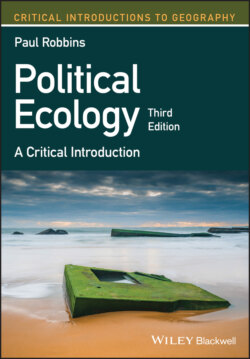Читать книгу Political Ecology - Paul Robbins - Страница 27
Political objects and actors thesis
ОглавлениеMaterial characteristics of non‐human nature and its components (dung, climate, refrigerators, bacteria, lawn grass, road salt, goats, and tropical soils) impinge upon the world of human struggles and are entwined within them, and so are inevitably political. Yet as these characteristics and agents assume new roles and take on new importance, they are also transformed by these interactions. People, institutions, communities, and nations assemble and participate in the networks that emerge, leveraging power and influence, just as non‐human organisms and communities do. In recent history, hegemonic institutions and individuals (environmental ministries, multinational corporations, corrupt foresters) have gained disproportionate influence by controlling and directing new connections and transformations, leading to unintended consequences and often pernicious results. In the process, resistance emerges from traditional, alternative, or progressive human/non‐human alliances marginalized by such efforts (especially along lines of class, ethnicity, and gender).
